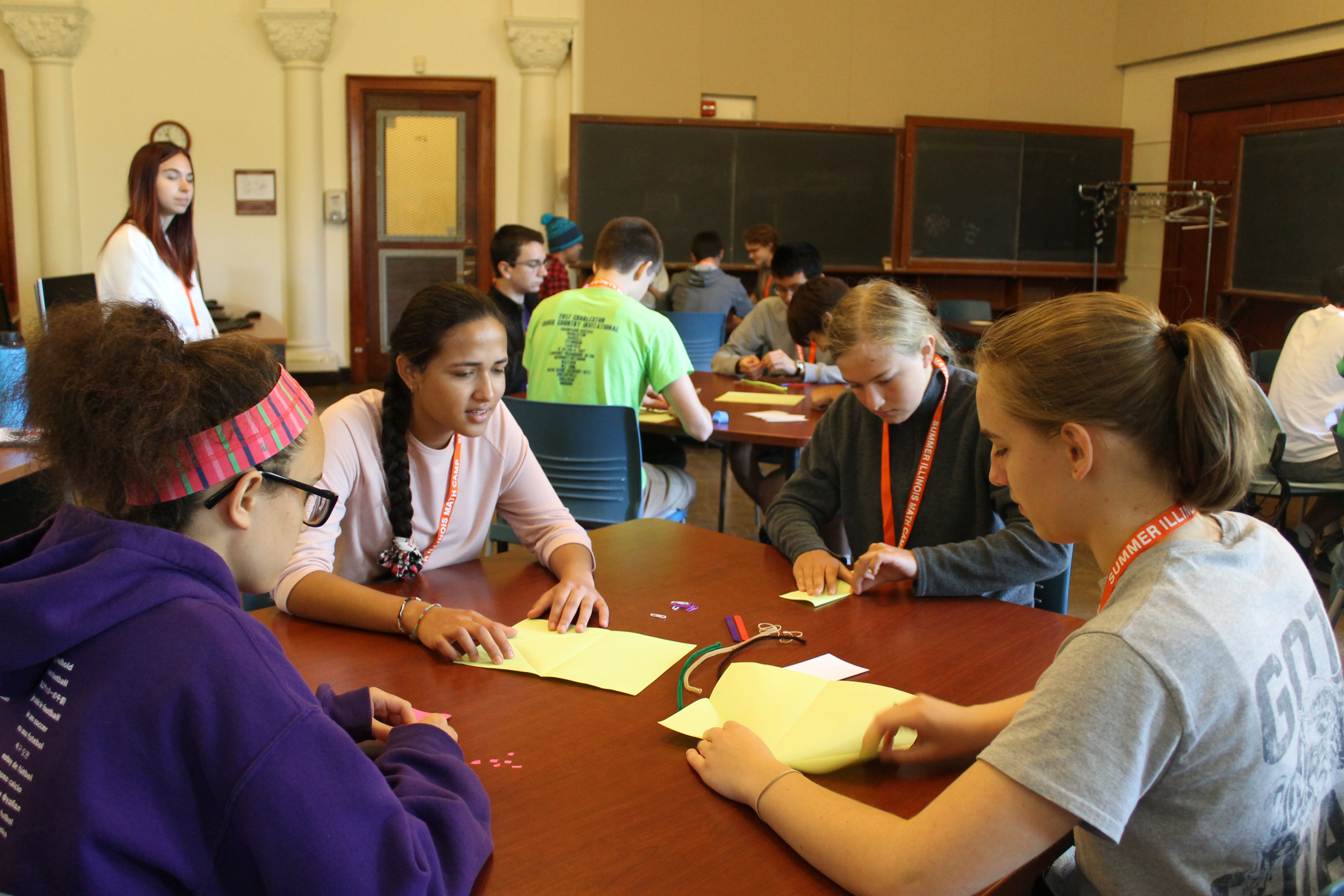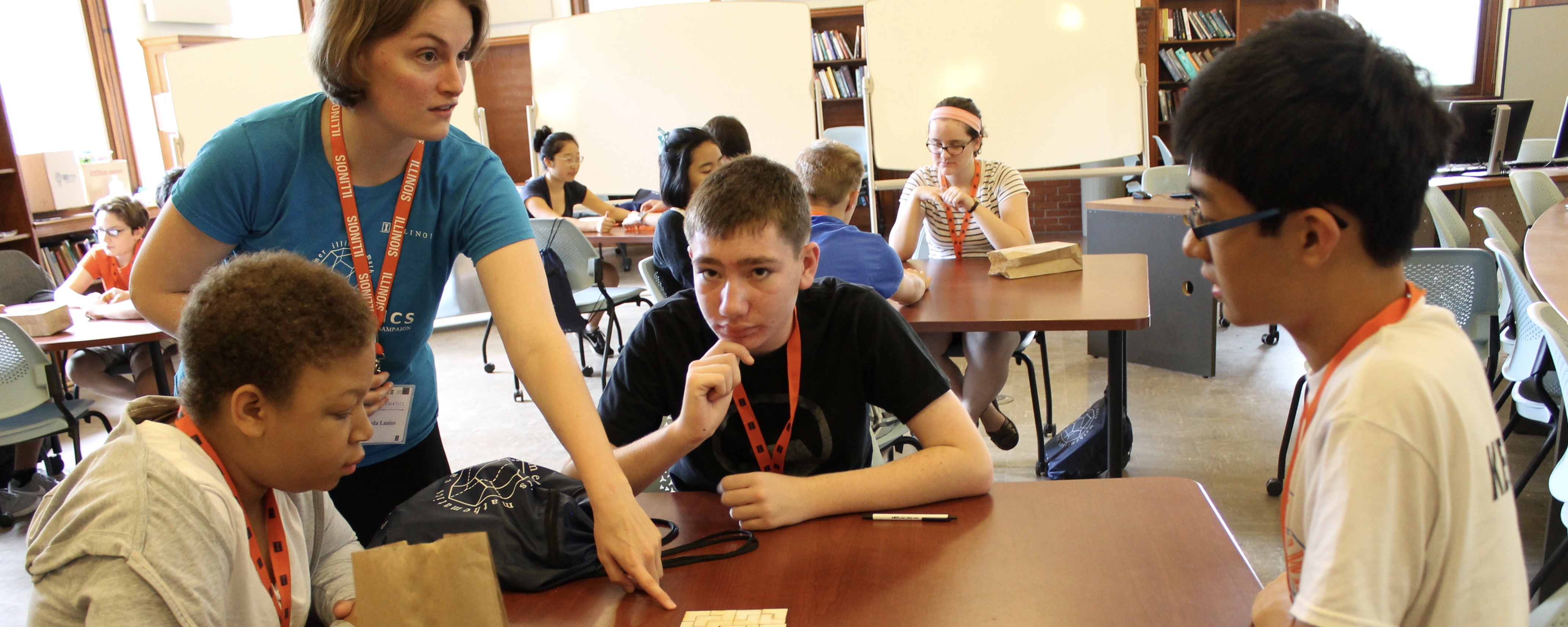For summer 2023, the positions are filled.
Assistant Instructors
We are hiring two undergraduate assistant instructors to help with the courses. This is an hourly position for up to 175 hours at a rate of $13/hour during 5 weeks of the summer (May 30 - June 30). Camp will consist of one week for Camp Epsilon for rising 8th-10th graders and one week for Camp Delta for rising 10th-12th graders. Additionally, assistant instructors are expected to spend approximately three weeks training, learning the material, and helping to prepare lesson plans.
Job description
Assistant instructors will work with instructors to develop lesson plans and lead online classroom activities. In addition to these duties, assistant instructors are expected to spend approximately three weeks before camp learning the background mathematics and working with instructors to create a course plan.
Assistant instructors will work together to review lesson plans and learn the material before staff orientation and training begins.
The position has been filled for summer 2023.
Qualifications
Assistant instructors must be undergraduate students at the University of Illinois at Urbana-Champaign. Preference will be given to applicants who have participated in one or more math Merit courses at the University of Illinois. Applicants must be enthusiastic, personable, and dependable. Experience teaching or tutoring is helpful, as is experience with similar academic enrichment programs, either as staff or as a participant. Applicants must possess a genuine interest in encouraging students to study math beyond the high school level, exhibit maturity and a positive attitude, and be willing to serve as a role model for students.
More information
Instructor
This position has been filled for summer 2023.
We will be hiring either two instructors to each teach one course each week of camp, or one instructor to teach one course each week of camp and two hybrid instructor/program coordinators who switch off so that each teaches one course one week and serves as program coordinator during the other week. Courses will meet for four consecutive days during each week of SIM Camp. Instructors are welcome to choose from the list of past topics below, but are expected to primarily create their own content:
- Counting Pigeons and Other Problem Solving Techniques (8-10th grade)
- Tropical Geometry (8-10th grade)
- Making and Breaking Codes: Cryptography (8-10th grade)
- Maximize Your Winnings: Using Math to Understand Games (8-10th grade)
- Beyond 1,2,3: How Mathematicians Count (8-10th grade)
- From Snowflakes to Seashells: Exploring Fractals (10-12th grade)
- Number Theory and Cryptology (10-12th grade)
- Mathematical Biology (10-12th grade)
- When a Straight Line Curves: The Geometries of Space (10-12th grade)
Instructors are also encouraged to consider creating their own course for a topic not listed above. Additionally, instructors will provide assistant instructors with materials and homework to give them the necessary mathematical background. Additionally, assistant instructors should be incorporated into the lesson planning and teaching process.
Qualifications
Instructors must be graduate students in the Department of Mathematics at the University of Illinois at Urbana-Champaign. Applicants must be enthusiastic, personable, and dependable. Experience teaching or tutoring is required. Experience with similar academic enrichment programs, either as staff or as a participant, is helpful, as is experience working with middle or high school students. Applicants must possess an interest in encouraging students to study math beyond the high school level, exhibit maturity and a positive attitude, and be willing to serve as a role model for students. Reliable internet access is required.
More information
Course descriptions
Counting Pigeons and Other Problem Solving Techniques (8-10th grade).
Tropical Geometry (8-10th grade). Students will learn how to do arithmetic in the tropical math setting, that is, with the maximum and addition operations. The students will be able to determine which properties, like commutativity, associativity or existence of inverses are shared between the tropical and the classical setting. By the end of the week, students will be able to construct linear tropical curves in the plane.
Making and Breaking Codes: Cryptography (8-10th grade). Students will learn how to write and read secret messages using modular arithmetic or “clock math.” We will practice sending each other messages with each method, as well as answer questions like “how can you read a message without knowing the code?” and “how can you share a code without other people being able to read the message?”
Maximize Your Winnings: Using Math to Understand Games (8-10th grade). Which games have a winning strategy? We played and explored a variety of games involving chance, strategy, social cooperation and anticipating the actions of others. We used mathematical approaches to help us understand and play games better.
Beyond 1, 2, 3: How Mathematicians Count (8th-10th grade). Students will explore how mathematicians count and compare different groups of objects. We will learn concepts such as the multiplication principle, combinations, and bijections. Students will answer questions such as “How many five digit numbers with distinct digits are there?” and “What is my chance of winning the lottery?”
From Snowflakes to Seashells: Exploring Fractals (10-12th grade).
Number Theory and Cryptology (10-12th grade). Number theory is a broad subject that looks at why natural numbers behave the way they do. Many ancient societies used math that is now considered number theory to find the side lengths of right triangles. Despite the seeming simplicity of the natural numbers, this is still an area of active research. SIM Camp students will look at some basic properties of prime numbers and how they can be used to encrypt messages. This is a high school version of the cryptology course.
Mathematical Biology (10-12th grade). From diseases to biological networks, we can use mathematics to create “models” to describe how systems behave over time. Mathematical Biology focuses on translating “real life” problems into mathematical structures we can analyze. Students will explore questions such as “How can you construct a model?”, “What makes a model accurate?” and “Can we apply it to different situations?” We will provide an overview of common types of models used in disciplines such as biology and social sciences. Students will learn how to represent and analyze these using equations, graphs, and computer software.
When a Straight Line Curves: The Geometries of Space (10-12th grade). Students will explore questions such as, “What happens when the angles of a triangle no longer sum to 180 degrees?” or “what does it mean to be a straight line?”. Students will imagine living in hyperbolic or spherical space, discovering for themselves the challenges presented by these unfamiliar geometries. By the end of the week, we will understand tilings and students will create their own hyperbolic and spherical art to take home.
Program Coordinator
This position has been filled for summer 2023.
We will be hiring either one program coordinator for both weeks of camp, or two hybrid instructor/program coordinators who switch off so that each teaches one course one week and serves as program coordinator during the other week. The program coordinator(s) will help with creating camp surveys and preparing camp materials. During camp, the program coordinator(s) will be available to help with any administrative tasks that arise, including but not limited to helping with students experiencing difficulties, dealing with disciplinary actions, and ensuring all sessions run smoothly.
Qualifications
The program coordinator must be a graduate student in the Department of Mathematics at the University of Illinois at Urbana-Champaign. Applicants must be enthusiastic, personable, and dependable. Experience teaching or tutoring is preferred. Experience with similar academic enrichment programs, either as staff or as a participant, is helpful, as is experience working with middle or high school students. Applicants must possess an interest in encouraging students to study math beyond the high school level, exhibit maturity and a positive attitude, and be willing to serve as a role model for students. Reliable internet access is required.
More information
Director
This position has been filled for summer 2023.
The director will be in charge of coordinating parents, staff, and university/department policies. This includes answering parent emails, ordering supplies and organizing, managing classrooms rooms, staff training, dealing with any interpersonal issues that arise, reviewing lesson plans, coordinating budgets with the business office, etc.
Qualifications
The director must be a graduate student in the Department of Mathematics at the University of Illinois at Urbana-Champaign. Applicants must be enthusiastic, personable, and dependable. Experience organizing events or managing employees is preferred. Experience with similar academic enrichment programs, either as staff or as a participant, is helpful, as is experience working with middle or high school students. Applicants must possess an interest in encouraging students to study math beyond the high school level, exhibit maturity and a positive attitude, and be willing to serve as a role model for students. Reliable internet access is required.
More information
SPONSORS
Support is provided by:
- Office of Public Engagement, University of Illinois for a Public Engagement Grant
- Department of Mathematics, University of Illinois
- Illinois Geometry Lab, University of Illinois
- Association for Women in Mathematics, University of Illinois
- Dolciani Mathematics Enrichment Grant , Mathematical Association of America
- National Science Foundation , Grant Number DMS-1449269
Please consider donating to the Mathematics Department of Mathematics Outreach fund, which supports our Summer Illinois Math camp and other outreach initiatives. Your support helps our department fulfill Illinois’s land grant mission.
Any opinions, findings, and conclusions or recommendations expressed in this material are those of the author(s) and do not necessarily reflect the views of the National Science Foundation. This material is based upon work supported by the National Science Foundation under Grant Number DMS-1449269.

